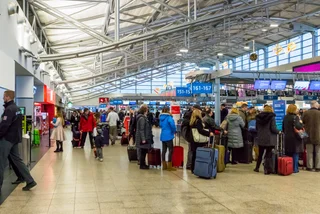Prague Airport faced 90-minute queues on Sunday as Czechia became one of the first EU countries to roll out the new Entry-Exit System (EES). Biometric fingerprint and facial scans, intended to replace passport stamping, malfunctioned at self-service kiosks, frustrating travelers.
While the delays tested passengers’ patience, experts say the new system addresses deeper national security challenges than airport lines suggest.
Jiří Mazánek, director of the National Center for Organized Crime (NCOZ), told ČTK and Czech Radio that inadequate border controls leave Czechia vulnerable to organized crime, from violent ATM robbery gangs to human trafficking networks.
Criminal organizations follow weak borders
“Criminal groups calculate which countries have weaker enforcement and target them strategically,” Mazánek said. He cited Balkan gangs using explosives and weapons to rob ATMs in Germany and Austria. Czechia, he warned, could face similar attacks if it adopts the euro.
“If we adopt the euro, itinerant gangs using explosives and weapons could hit us too,” he said.
NCOZ data suggest organized crime does not target countries randomly. “They analyze where detection risks are lowest and profits highest,” Mazánek explained. “We need to know who is here, ensure people cannot change their identity, and maintain control.”
ATM robbery gangs exemplify this threat. These itinerant groups move across borders, hitting multiple countries before law enforcement can coordinate responses.
Mazánek advocates mandatory biometric documents for all foreign visitors, noting an irony: Czech citizens traveling to Russia are fingerprinted at the border, yet Czechia does not collect similar data.
A transit country at risk
Czechia’s vulnerability stems partly from its role as a transit country for migrants rather than a destination. African and Middle Eastern migrants typically move west to join family already settled elsewhere in the EU, while Czechia’s low social benefits and work requirements discourage settlement.
“Many illegal migrants won’t come here because they have to work, and benefits are low,” Mazánek said. “We are not a welcoming country in this regard.”
This transit status makes the country attractive to criminal networks exploiting weak enforcement. NCOZ reports note that organized crime groups adjust operations based on enforcement levels, targeting countries where risks are lowest.
Mazánek contrasted this with the Ukrainian community in Czechia, describing it as “hardworking” and more successful at integrating than in other European countries.
On Tuesday at an EU meeting in Luxembourg, Interior Minister Vít Rakušan emphasized the importance of strong border management, noting that effective controls rely on knowing who enters the country and preventing identity fraud through biometric documentation.
Human trafficking and modern slavery
Border weaknesses also contribute to human trafficking, including what Mazánek calls “modern slavery.” Victims include both foreign workers and vulnerable Czech citizens.
“Modern slavery is more common in the Czech Republic than we might think,” he said. “We’ve investigated cases involving 10 to 15 perpetrators abusing 15 to 20 people over several years.”
Police recorded 39 human trafficking cases last year, though Mazánek believes the real number is higher. With hundreds of thousands of foreign workers in Czechia, the country has become a target for trafficking operations.
Victims often arrive legally through agencies but are forced into conditions different from their contracts. Their wages may be reduced, documents confiscated, and labor exploited in agriculture, construction, laundries, or as household servants. Physical violence is rare; control is exercised financially and socially, with perpetrators managing debts, housing, and paperwork.
NCOZ launched the “Work in Chains” awareness campaign to encourage victims to come forward. Materials are available in Czech, English, Ukrainian, Romanian, Bulgarian, and Russian. The organization also partners with non-profit La Strada for confidential support.
Security vs. imperfect technology
All Schengen states must implement the EES system within 180 days of its Oct. 12 launch. Mazánek believes the system will eventually strengthen border management.
“The alternative is worse: weak controls that allow criminal networks to operate freely,” he said.
But last weekend’s chaos at Prague Airport shows that the gap between policy ambition and operational reality may take time to close.




